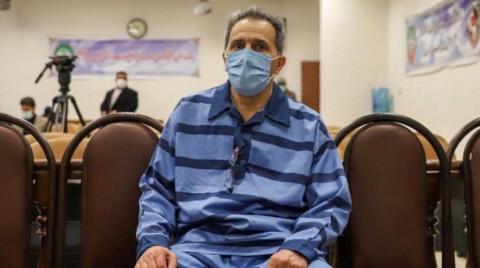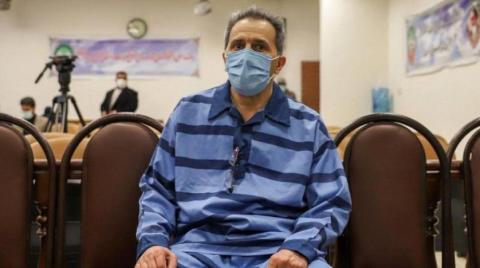
Iran has claimed that an Iranian-German duel national who had been sentenced to death died last week before his execution could be carried out.
“Jamshid Sharmahd was sentenced to death, his execution was imminent, but he died before it could be carried out,” the judiciary spokesman Asghar Jahangir told reporters without elaborating. It is understood Tehran claims he suffered a stroke.
When Iranian officials announced his death on 28 October, they gave no indication that he had died of natural causes, saying his sentence was final and he had been punished.
There was scepticism about how such a miscommunication could have occurred, or equally for what purpose, if any, Iran wished to change the official cause of death.
The German foreign minister, Annalena Baerbock, had responded to Sharmahd’s death by closing three Iranian consulates in Germany and recalling the German ambassador to Tehran for consultations.
Sharmahd’s daughter Gazelle, who is based in the US, has since demanded proof of how his life had ended, and also called for his body to be returned to her and her family.
The Iranian foreign minister, Abbas Araghchi, was unapologetic about his death, saying “no terrorist enjoys impunity in Iran. Even if supported by Germany”.
The Iranian president, Masoud Pezeshkian, also used spoke of an execution in defending the prison authorities’ actions. Referring to the war in Gaza, he said: “It’s unbelievable when we execute someone in our country, they say you don’t respect human rights, but there is silence when women and children are killed and their water and bread blocked. Is that humane”?
Last year, 75% of all recorded executions in the world were related to Iran.
The US deputy special envoy for Iran, Abram Paley, condemned the “execution” of Sharmahd as “the latest heinous act in the long history of transnational repression by the Iranian regime”.
“Sharmahd should not have been jailed in the first place,” Paley wrote on X . “His abduction and transfer to Iran, as well as the mock trial and the reports about his torture were heinous.”
Gazelle Sharmahd wrote on social media on Sunday: “Please know that we do not accept condolences until we have received evidence by the German and American authorities of the reported murder of my father and the exact circumstances.”
On Monday, she wrote: “There are many possibilities as to what might have happened. He may have been poisoned, he may have died from more than 1,500 days of solitary confinement and mistreatment. He may have been hanged.”
Her suspicions had been aroused partly because his death was announced in the evening, when executions in Iran are normally carried out at dawn.
Sharmahd was sentenced to death in February 2023 for the capital offence of “corruption on Earth” over his alleged role in a 2008 attack that led to 14 deaths, a charge his family have always denied.
Separately, Iranian state media said a university student had been taken to an unnamed psychiatric hospital after she stripped to her underwear in central Tehran on 2 November.
Amnesty International said the report was “very alarming since it has previously documented how Iran’s authorities equate defying compulsory veiling with ‘mental disorders’ that need ‘treatment’.”
According to some accounts, the woman removed her clothes in protest against the abusive enforcement of veiling by security officials at Tehran’s Islamic Azad University. Other reports said she did so after a row in which she sought to film students, and claimed she had come to save people.
The head of the Iran Reform Front, Azar Mansouri, described the action of “one of our daughters” as shocking and called for less repressive social measures.












